Oil Pan Replacement Lower Pan
Removal Procedure
- Disconnect the negative battery cable.
- Raise and support the vehicle. Refer to Lifting and Jacking the Vehicle in General Information.
- Remove the splash shield bolts.
- Remove the splash shield.
- Drain the engine oil.
- Disconnect the oil level sensor connection.
- Remove the oil level sensor wire electrical connector C-clip (1) from the oil pan housing.
- Remove the oil pan bolts.
- Remove the oil pan from the oil pan housing.
- Pull the oil level sensor electrical connection from the upper oil pan housing.
- Remove the oil level sensor bolts.
- Remove the oil level sensor from the oil pan.
- Clean the oil pan.
- Clean the oil pan gasket surfaces.
Caution: Unless directed otherwise, the ignition and start switch must be in the OFF or LOCK position, and all electrical loads must be OFF before servicing any electrical component. Disconnect the negative battery cable to prevent an electrical spark should a tool or equipment come in contact with an exposed electrical terminal. Failure to follow these precautions may result in personal injury and/or damage to the vehicle or its components.
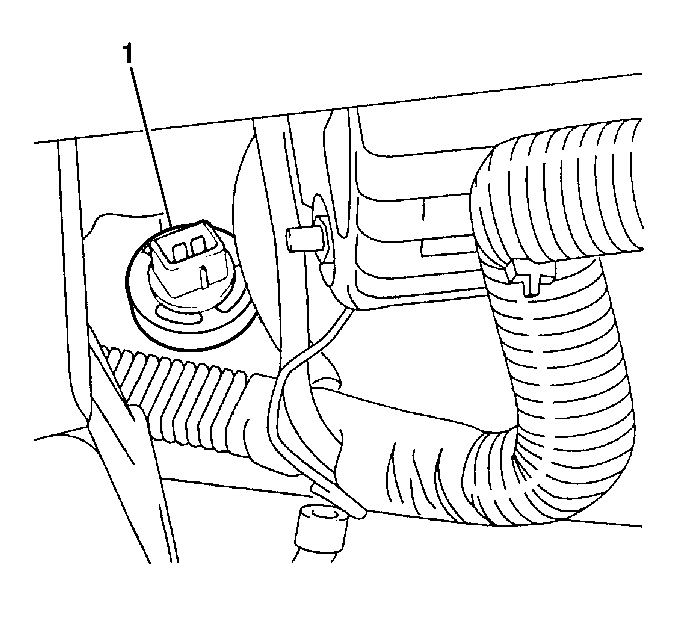
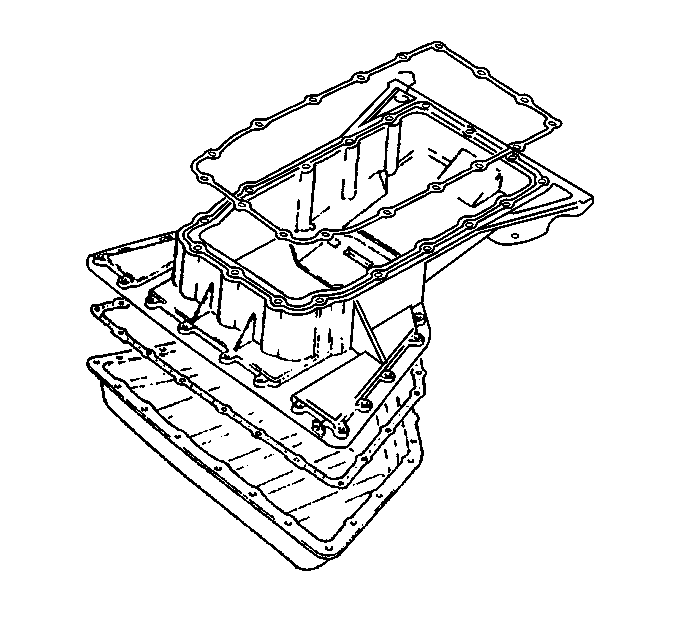
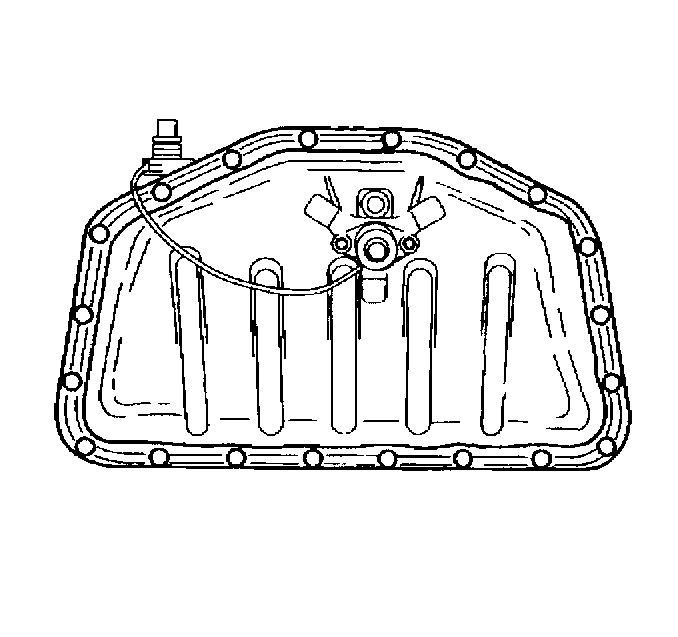
Installation Procedure
- Install the oil level sensor to the oil pan.
- Install the oil level sensor bolts.
- Install the oil pan gasket.
- Replace the oil level sensor wire electrical connector O-ring.
- Support the oil pan.
- Install the oil level sensor wire electrical connector to the oil pan housing with the C-clip (1).
- Install the oil pan to the oil pan housing.
- Install the oil pan bolts.
- Reconnect the oil level sensor electrical connection.
- Install the splash shield.
- Install the splash shield bolts.
- Lower the vehicle.
- Refill the engine oil. Refer to Approximate Fluid Capacities .
- Reconnect the negative battery cable.
- Reprogram the applicable accessories.

Notice: Use the correct fastener in the correct location. Replacement fasteners must be the correct part number for that application. Fasteners requiring replacement or fasteners requiring the use of thread locking compound or sealant are identified in the service procedure. Do not use paints, lubricants, or corrosion inhibitors on fasteners or fastener joint surfaces unless specified. These coatings affect fastener torque and joint clamping force and may damage the fastener. Use the correct tightening sequence and specifications when installing fasteners in order to avoid damage to parts and systems.
Tighten
Tighten the oil level sensor bolts until fully seated. Do not strip
the oil level sensor bolts.



Tighten
Tighten the oil pan bolts to 8 N·m (71 lb in).
Tighten
Tighten the splash shield bolts until fully seated. Do not strip the
splash shield bolts.
Oil Pan Replacement Upper Housing
Removal Procedure
Tools Required
| • | J 28467-A Engine Support Fixture |
| • | J 28467-450 Engine Support Fixture Adapter |
| • | J 36857 Lift Brackets |
- Remove the oil pan. Refer to Oil Pan Replacement .
- Remove the engine mount lower nuts from the frame bracket note orientation of alignment tab (1).
- Remove the A/C compressor hose support strap bolt from the front of the oil pan housing.
- Remove the four transmission bolts from the oil pan housing.
- Remove all but the four corner oil pan housing bolts.
- Match mark the propeller shaft to allow for correct realignment.
- Remove the propeller shaft bolts.
- Slide the propeller shaft rearward, away from the transmission.
- Secure the propeller shaft in place.
- Remove the catalytic converter hanger bolts (1).
- Remove the catalytic converter nuts from the exhaust manifold.
- Lower the catalytic converters and secure with mechanic's wire.
- Remove the two idler arm bolts from the frame and lower the relay rod out of the way.
- Lower the vehicle.
- Use the J 28467-A , the J 28467-450 and the J 36857 to support and raise the engine to enable removal of the upper oil pan housing.
- Raise and support the vehicle. Refer to Lifting and Jacking the Vehicle in General Information.
- Remove the remaining oil pan housing bolts.
- Remove the oil intake pipe bolts.
- Remove the oil intake pipe.
- Remove the oil pan housing toward the front of the vehicle, using care so as not to damage the aluminum mating surface of the oil pan housing.
- Remove the gasket (1).
- Remove all RTV sealant and thoroughly clean the oil pan housing and engine block.
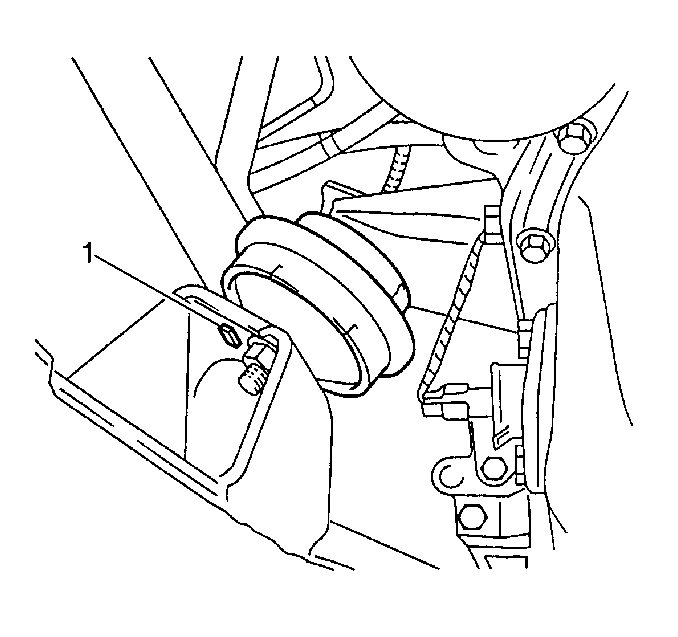
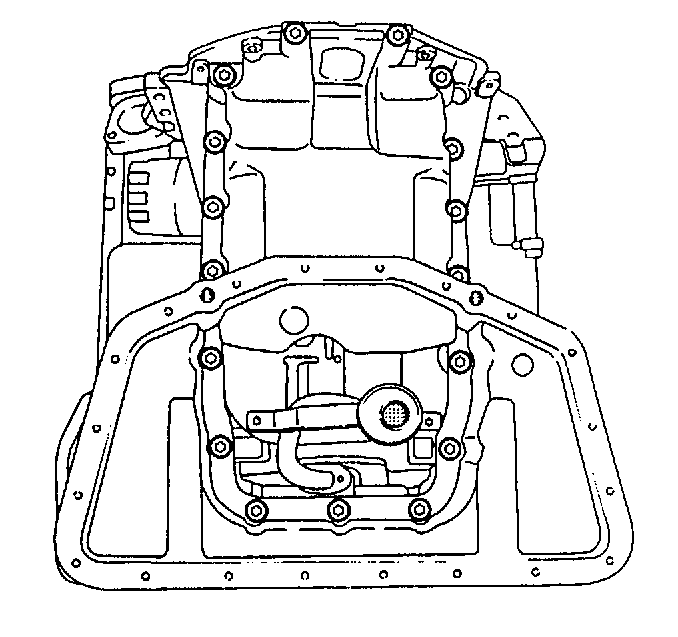
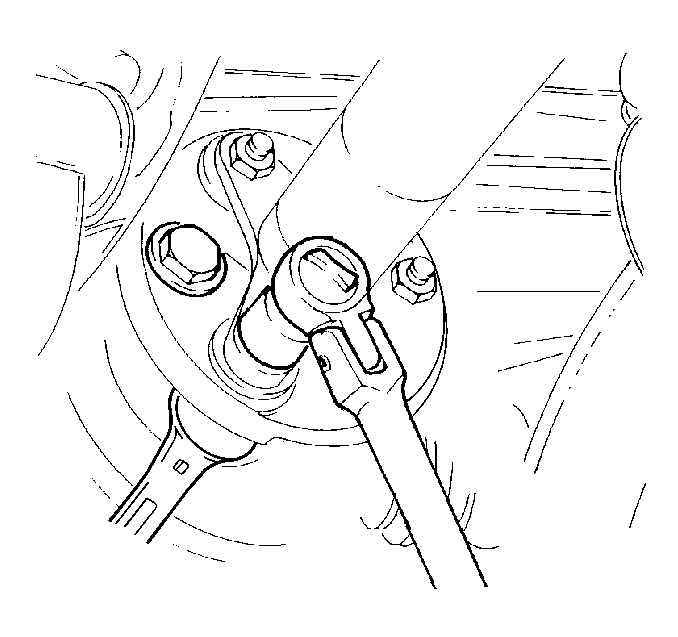
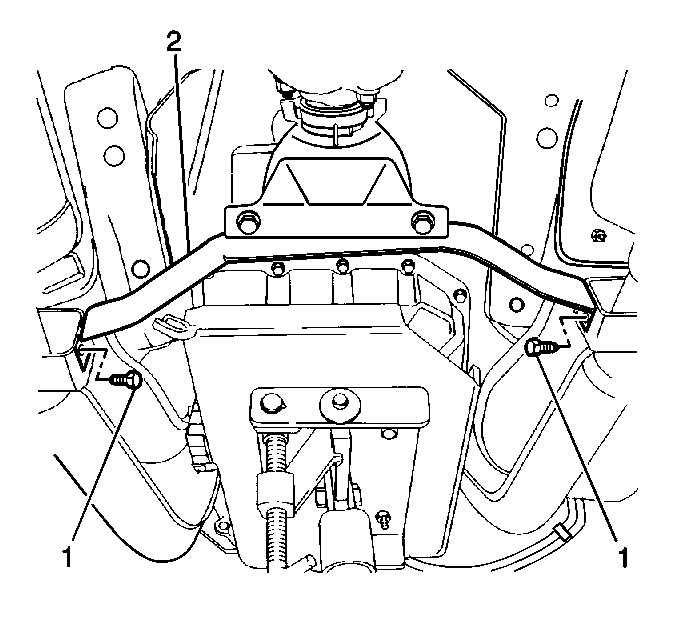
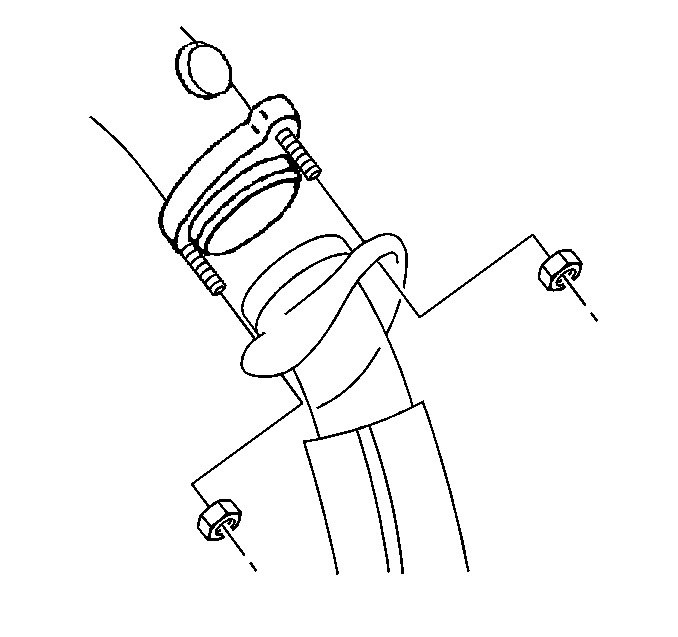
Important: Use care so as not to damage surrounding components and/or attachments to the engine when raising.
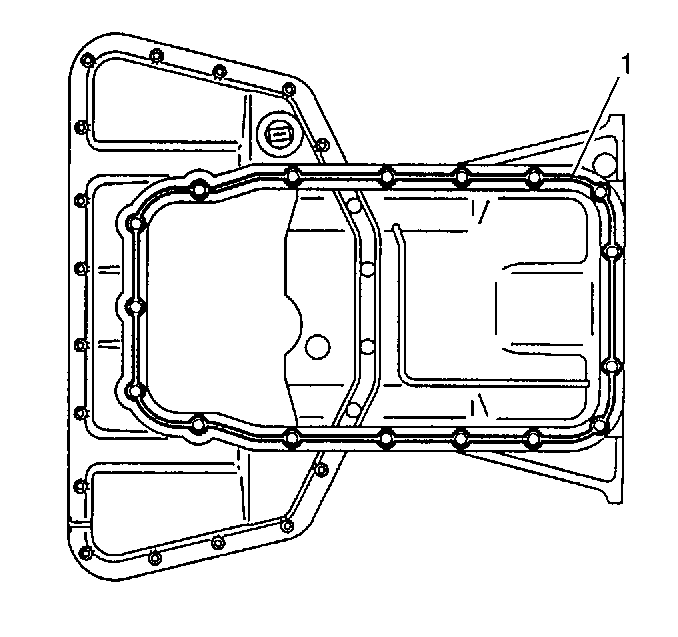
Installation Procedure
- Apply a bead of silicone sealing compound, GM P/N 12346286 or equivalent, in the bottom of the oil pan housing groove. Keep the bead at least 10 mm (0.4 in) from the bolt holes to prevent carry over onto bolt threads.
- Install the new oil pan housing rubber seal in the groove of the housing.
- Apply a 3 mm (0.12 in) bead of silicone sealant, GM P/N 12346286 or equivalent, on the OUTSIDE edge of the seal at the front of the housing and apply an identical bead on the INSIDE edge of the seal at the rear of the housing. The beads will overlap at the middle of the housing as shown in the supporting illustration.
- Carefully install the oil pan housing through the front of the vehicle and allow to rest on crossmember.
- Install the oil intake pipe.
- Install the oil intake pipe bolts.
- Hold the oil pan housing in place with four bolts on the corners.
- Lower the vehicle.
- Carefully lower the engine into place.
- Remove the J 28467-A , the J 28467-450 and the J 36857 .
- Raise and support the vehicle. Refer to Lifting and Jacking the Vehicle in General Information.
- Install the remaining oil pan housing bolts.
- Install the four transmission bolts to the oil pan housing.
- Raise the relay rod and install the bolts for the idler arm.
- Raise the catalytic converters into place and install the catalytic converter nuts.
- Install the catalytic converter hanger brackets (2).
- Install the catalytic converter bolts (1).
- Slide the propeller shaft into position.
- Align the propeller shaft with the markings previously scribed in the removal procedure.
- Install the propeller shaft bolts.
- Install the A/C compressor hose support strap bolt to the oil pan housing.
- Install the engine mount lower nuts to the frame, ensuring the alignment tabs (1) are in place.
- Install the oil pan. Refer to Oil Pan Replacement .
- Install the splash shield.
- Install the splash shield bolts.
- Lower the vehicle.
- Refill the engine oil. Refer to Approximate Fluid Capacities .
- Reconnect the negative battery cable.
- Reprogram the applicable accessories.
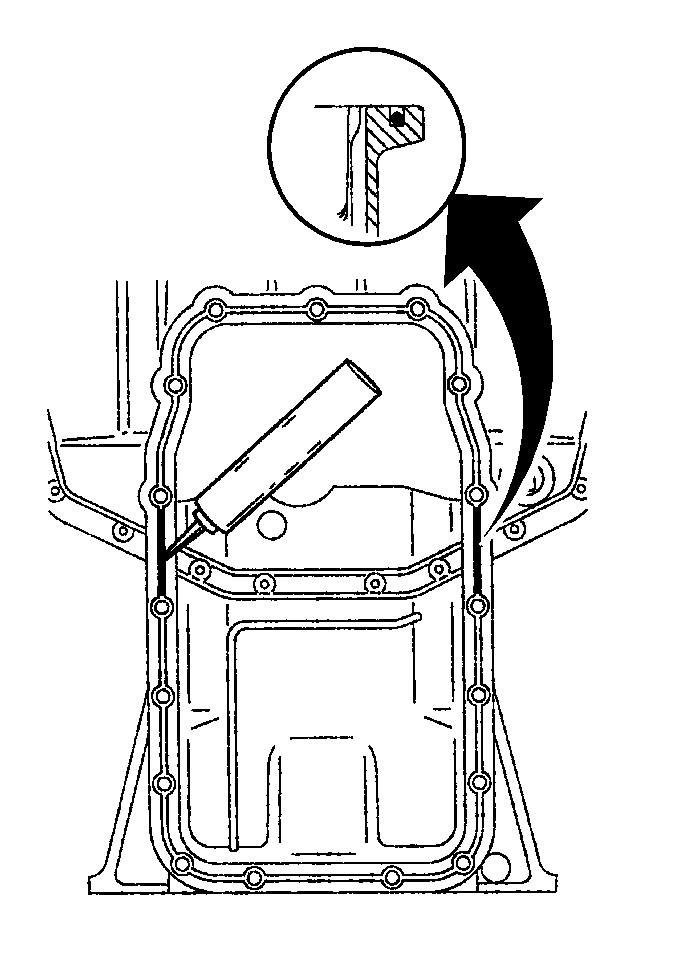
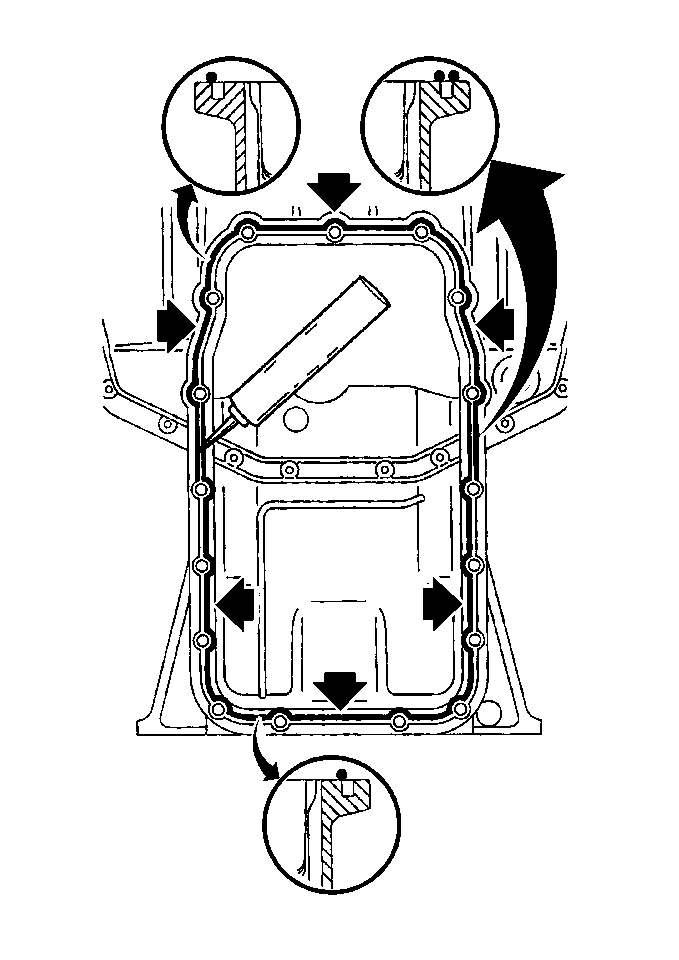
Important: Installation of the oil pan housing must be carried out within 10 minutes of applying the sealant.
Notice: Use the correct fastener in the correct location. Replacement fasteners must be the correct part number for that application. Fasteners requiring replacement or fasteners requiring the use of thread locking compound or sealant are identified in the service procedure. Do not use paints, lubricants, or corrosion inhibitors on fasteners or fastener joint surfaces unless specified. These coatings affect fastener torque and joint clamping force and may damage the fastener. Use the correct tightening sequence and specifications when installing fasteners in order to avoid damage to parts and systems.
Tighten
Tighten the oil intake pipe bolts to 8 N·m (71 lb in).

Tighten
Tighten the oil pan housing bolts to 15 N·m (11 lb ft).
Tighten
Tighten the transmission bolts to 40 N·m (30 lb ft).
Tighten
Tighten the idler arm bolts to 60 N·m (44 lb ft).

Tighten
Evenly tighten the catalytic converter nuts to 25 N·m (18 lb ft).

Tighten
Tighten the catalytic converter bolts to 20 N·m (15 lb ft).

Tighten
Tighten the propeller shaft bolts to 95 N·m (70 lb ft).
Tighten
Tighten the A/C compressor hose support strap bolt to 8 N·m
(71 lb in).

Tighten
Tighten the engine mount lower nuts to 55 N·m (41 lb ft).
Tighten
Tighten the splash shield bolts until fully seated. Do not strip the
splash shield bolts.
